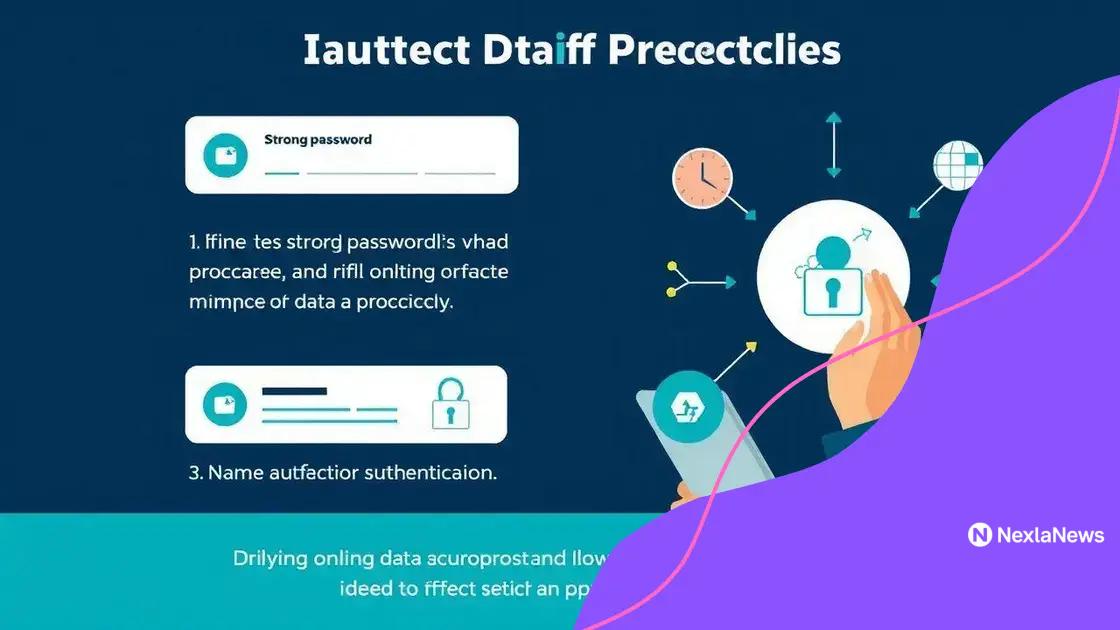Data privacy issues: Are you risking your personal information?

Data privacy involves protecting personal information through regulations and best practices, ensuring users have control over their data and organizations are accountable for its secure handling.
Data privacy issues are more relevant than ever. With countless personal details shared online, do you know how secure your information really is? Let’s dive into this important topic.
Understanding data privacy issues
Understanding data privacy issues is crucial in our digitally connected world. With increasing amounts of personal information shared online, we must be aware of how this data can be misused. Awareness is the first step in protecting your privacy.
What Are Data Privacy Issues?
Data privacy issues refer to concerns surrounding how personal data is collected, stored, and used. Individuals often feel vulnerable when their information is at risk. Understanding these concerns helps in taking proactive measures.
Common Data Privacy Issues
Several factors contribute to data privacy challenges. Here are some major concerns:
- Data breaches that expose personal information.
- Inadequate consent mechanisms when sharing data.
- Lack of transparency from companies about data usage.
- Online tracking and profiling without clear user awareness.
These examples highlight the importance of being informed about what happens to your data. Many users remain unaware of the extent to which their data is tracked, often unknowingly consenting to broad data collection practices.
Why Should You Care?
Understanding data privacy issues can help you make better choices online. When you know what data is being collected, you can take steps to protect yourself. This might involve adjusting your privacy settings or being more selective about the information you share.
For instance, reviewing privacy policies before signing up for services can prevent unintended data sharing. Every click and every form you fill out may contribute to a larger picture of your interests and habits. Being cautious can significantly reduce risks.
Steps to Safeguard Your Data
Here are some actions to help you secure your privacy:
- Use strong, unique passwords for different accounts.
- Enable two-factor authentication wherever possible.
- Regularly update your software to protect against vulnerabilities.
- Be cautious about public Wi-Fi networks when accessing sensitive information.
By following these steps, you can enhance your data privacy. Staying informed is essential as new threats emerge regularly in our data-driven environment.
Common threats to data privacy
Common threats to data privacy can impact everyone, regardless of how careful you are online. Being aware of these risks is essential to protect your information. Let’s explore these threats so you can be better prepared to defend your privacy.
Data Breaches
One of the most significant threats comes from data breaches. These occur when hackers gain unauthorized access to databases, often stealing sensitive information such as names, email addresses, and even financial details. Companies can also be held accountable if they do not secure user data properly.
Phishing Attacks
Phishing is another major concern. Attackers use emails or messages that appear to be from legitimate sources to trick users into revealing personal information. This tactic not only compromises individual accounts but can also lead to identity theft.
Malware
Malware, which includes viruses and spyware, can infiltrate devices and steal data without the user’s knowledge. Once installed, these programs can monitor your activity, capture keystrokes, and harvest your sensitive information.
Inadequate Data Protection Policies
Many organizations fail to implement adequate data protection strategies. This can lead to vulnerabilities that hackers exploit. By understanding where these policies fall short, users can make informed decisions about which services to trust with their data.
Awareness of these common threats can empower you to take control of your digital life. Simple steps like enhancing password security and recognizing phishing attempts are essential in safeguarding your data.
Insufficient Permissions
Another issue arises when applications request more permissions than necessary to function. This often leads to the collection of more data than what is required. It is essential to review these permissions to limit data sharing.
- Check app permissions regularly.
- Only grant permissions necessary for the app’s functionality.
- Use tools to monitor data sharing.
Staying informed about these threats can make a significant difference in maintaining your data privacy. By taking proactive steps, you ensure that your information remains safe from malicious intentions.
Best practices for protecting your data

Implementing the best practices for protecting your data is essential in today’s digital landscape. Many people underestimate the importance of safeguarding their personal information. By following effective measures, you can significantly reduce the risk of data breaches.
Use Strong Passwords
Your first line of defense is creating strong passwords. A good password should be unique and contain a mix of letters, numbers, and symbols. Avoid using easily guessable information like birthdays or names.
Enable Two-Factor Authentication (2FA)
Two-factor authentication adds an extra layer of security. Even if someone obtains your password, they cannot access your account without the second form of identification, which is typically a code sent to your mobile device.
Regularly Update Your Software
Using outdated software can expose your devices to vulnerabilities. Make sure to keep your operating system, applications, and antivirus software up to date. These updates often include patches that protect against new threats.
Be Cautious with Public Wi-Fi
Public Wi-Fi networks are often not secure, making it easy for attackers to intercept your data. If you connect to public Wi-Fi, avoid accessing sensitive information or using banking apps.
It’s also important to use a virtual private network (VPN) when using public Wi-Fi. A VPN encrypts your internet connection, adding a layer of security that protects your data from prying eyes.
Review Privacy Settings
Regularly review the privacy settings on your social media accounts and other online services. Adjust these settings to limit who can see your information. By controlling your privacy settings, you can protect yourself from unwanted exposure.
- Limit the amount of personal information shared.
- Control app permissions on your devices.
- Delete accounts you no longer use.
Additionally, educate yourself about potential phishing scams. Be wary of emails or messages that ask for personal information, even if they appear to come from legitimate sources. Always verify the sender before responding.
By adopting these best practices, you enhance your data privacy and protect yourself from various threats. Remaining vigilant is key to ensuring your data remains safe.
The role of laws in data privacy
The role of laws in data privacy is crucial for protecting individuals’ information. Different countries have established various regulations to ensure that personal data is handled responsibly. Understanding these laws helps individuals know their rights and the protections in place.
General Data Protection Regulation (GDPR)
The GDPR is one of the most significant data protection laws in the world. Enforced in the European Union, it mandates that organizations must obtain explicit consent from users before collecting their personal data. This regulation empowers individuals by giving them control over their information.
California Consumer Privacy Act (CCPA)
In the United States, the CCPA offers similar protections. It allows California residents to know what personal data is being collected, the purpose of its collection, and who it is shared with. Furthermore, individuals can request the deletion of their data. Such laws encourage transparency and accountability among businesses.
Other International Laws
Countries like Canada, Brazil, and Australia have also started implementing their data privacy regulations. These laws often share similarities with the GDPR and CCPA, focusing on user consent and data protection rights. Understanding these international laws is vital for global businesses that handle personal data.
Laws play a significant role in shaping companies’ practices around data privacy. Organizations must comply with regulations to avoid hefty fines. This legal framework compels companies to prioritize data security measures and transparency regarding data usage.
Enforcement and Compliance
Compliance with data protection laws is monitored by regulatory bodies. These organizations investigate complaints and can impose penalties for violations. Awareness of these laws encourages individuals to report breaches and hold companies accountable for their actions.
Engaging in data privacy issues is also essential for consumers. As businesses comply with regulations, there is a greater likelihood of improved data protection practices. Ultimately, strong laws contribute to a safer digital environment.
Future trends in data privacy
Understanding future trends in data privacy is essential for individuals and businesses alike. As technology evolves, so do the challenges and solutions related to data protection. People are becoming more aware of their privacy rights, shaping the future of how data is handled.
Increased Focus on User Consent
One major trend is the growing emphasis on user consent. Laws across the globe, like GDPR and CCPA, are pushing for clearer consent mechanisms. This means companies will need to provide easy-to-understand options for consumers to agree to data collection.
Advancements in Technology
Technology is also changing how we protect data. Tools like artificial intelligence and machine learning will play a vital role in identifying potential security breaches. These technologies can analyze large amounts of data quickly, helping to combat threats in real time.
Privacy by Design
Another key trend is the concept of ‘privacy by design.’ This approach encourages organizations to integrate privacy measures from the beginning of product development. Instead of adding security features later, businesses will proactively build privacy into their systems.
The use of encryption technologies will become more widespread as companies seek to protect user data. Enhanced encryption practices can secure data storage and transmission, making it harder for hackers to access sensitive information.
More Regulations and Compliance Needs
As data privacy concerns grow, more regulations are likely to emerge. Governments may introduce new laws to adapt to the digital landscape. Organizations will need to stay compliant or face penalties, making data privacy a top priority.
Individuals will become more educated about their privacy rights. This rise in awareness will likely lead to increased demand for transparency from organizations regarding data use. Users will expect clarity about what data is collected and how it is managed.
Impact of IoT Devices
The Internet of Things (IoT) will continue to expand, leading to more connected devices in our daily lives. While IoT devices provide many conveniences, they also raise significant privacy concerns. Manufacturers will need to address vulnerabilities in device security.
The future of data privacy is both challenging and promising. By staying informed about these trends, individuals and organizations can better navigate the evolving landscape of data protection.
FAQ – Frequently Asked Questions about Data Privacy
What is data privacy?
Data privacy refers to the proper handling, processing, and storage of personal information to protect individuals’ privacy rights.
Why is data privacy important?
Data privacy is important because it helps prevent identity theft, protects sensitive information, and maintains trust between individuals and organizations.
How can I protect my data online?
You can protect your data online by using strong passwords, enabling two-factor authentication, and being cautious with public Wi-Fi networks.
What are the main laws governing data privacy?
Some key laws include the General Data Protection Regulation (GDPR), California Consumer Privacy Act (CCPA), and various international privacy regulations.
